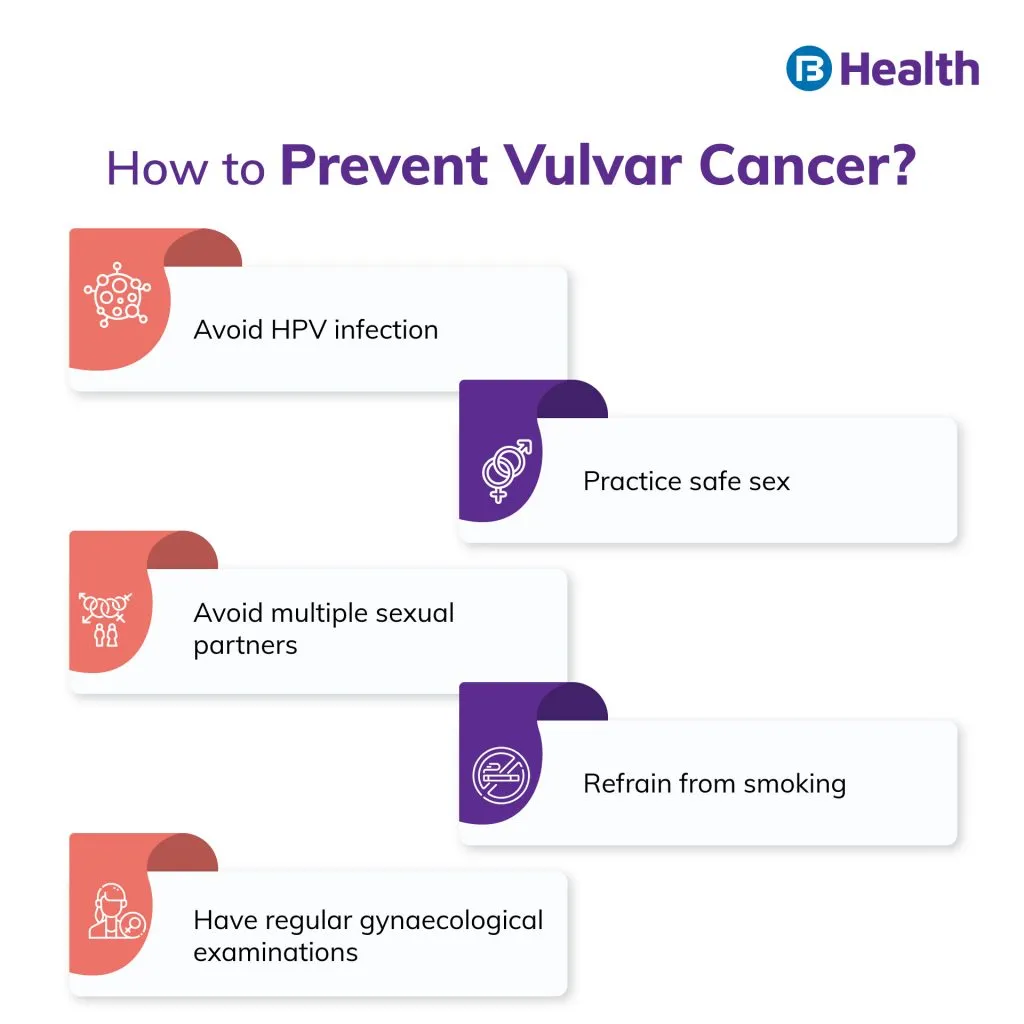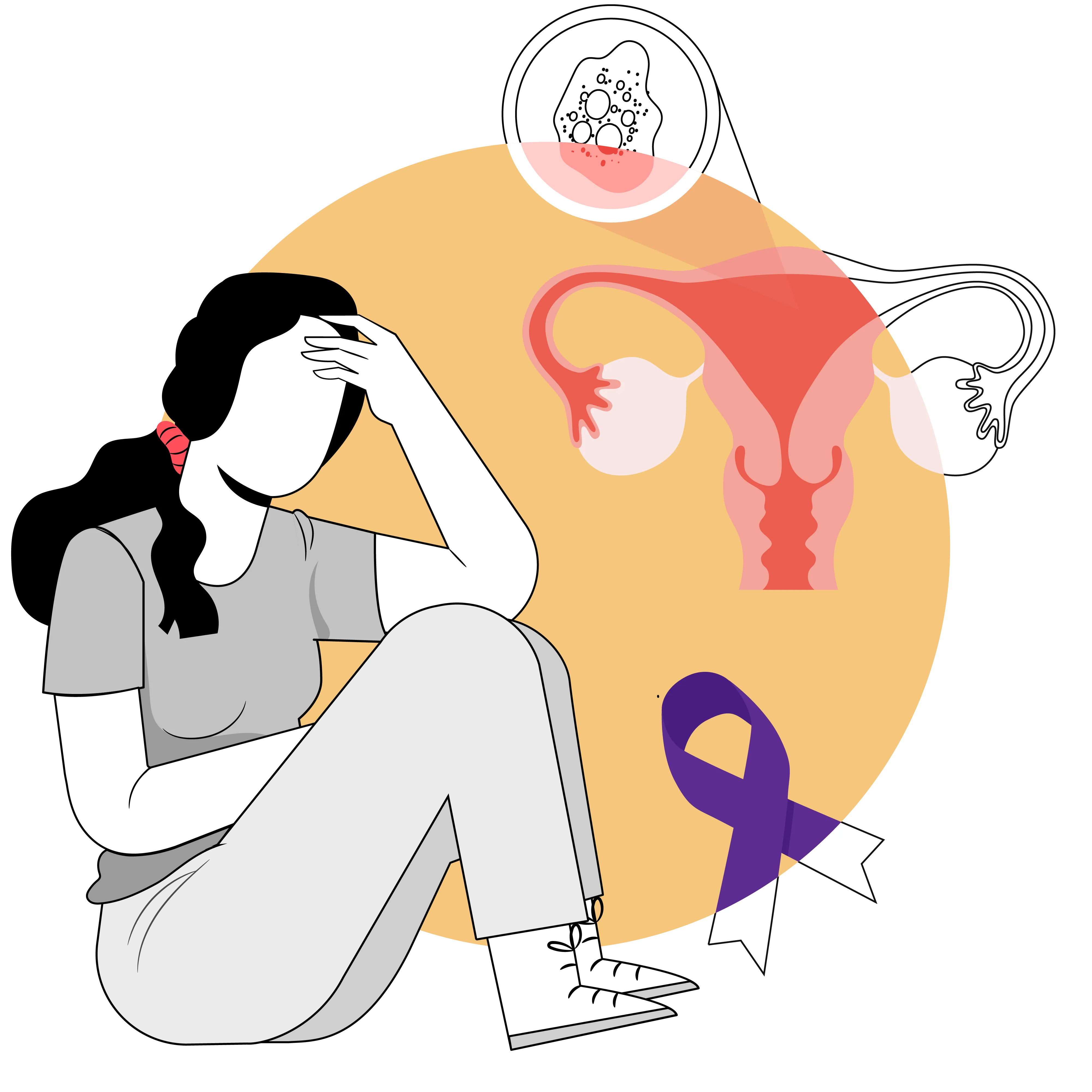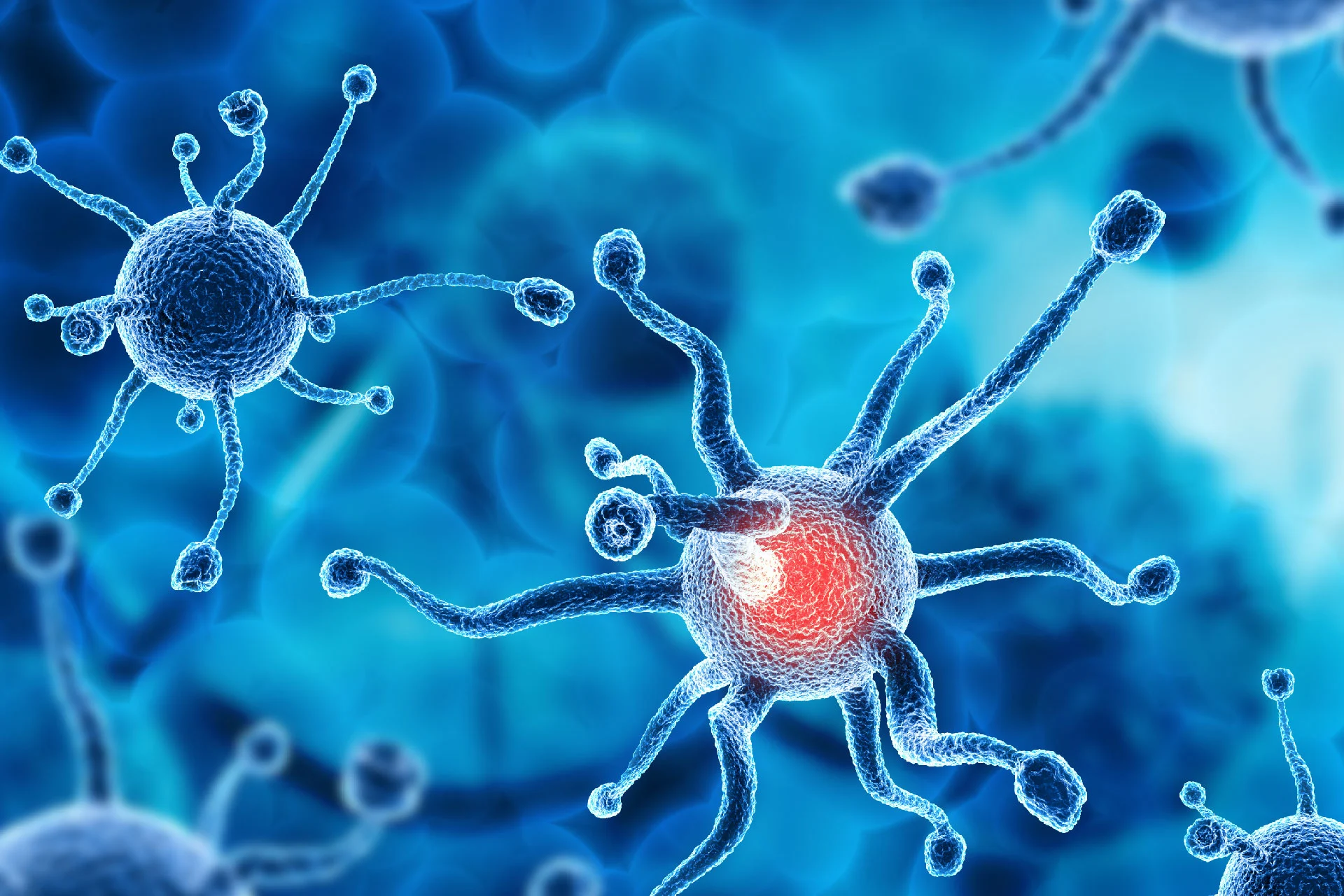Cancer | 8 min read
What are the Causes, Symptoms, and Treatment of Vulvar Cancer?
Medically reviewed by
Table of Content
Synopsis
Key Takeaways
- The stage at which vulvar cancer has reached will determine the mode of treatment
- Age plays a significant role when determining your chances of contracting vulvar cancer
- When detected early, the chances of surviving vulvar cancer are as high as 85%
Vulvar cancer is a rare type of cancer of the female genitalia. This cancer forms on the outer lips of the vagina. This genital organ that protects the female reproductive system is called the vulva. Incidentally, this is where this cancer gets its name from. In India, 0.6% of all cancers reported in women are vulvar cancer [1]. Most cancers that affect women in India are breast cancer, cervical cancer, ovarian cancer and colorectal cancer [2]. Let's shed some light on this rare type of cancer and understand vulvar cancer symptoms, causes and treatment.
Vulvar Cancer Causes
Cancer is the unrestrained growth of cells in the body. Usually, the cancer is named after the type of cell that is reproducing uncontrollably.
Most of the time, vulvar cancer affects the labia majors, which covers the vagina. Here are some of the known causes of vulvar cancer.
HPV (Human Papilloma Virus)
HPV is the most common sexually transmitted disease. This infection causes warts near the genitals of the infected person. HPV significantly increases the risk of vulvar cancer.
Sexually Transmitted Diseases
Women are susceptible to vulvar cancer when they have a prior history of STDs like Herpes.
Smoking
Studies show that smoking increases the risk of vulvar cancer [3]. Furthermore, the chances of vulvar cancer increase further when smoking and STDs are involved.
Kidney Transplant
An organ transplant, like a kidney transplant, requires the patient to be on a life-long course of immune suppressants. These medications weaken the immune system such that the body doesn't reject the newly transplanted organ. Therefore, women with a weaker immune system are susceptible to vulvar cancer.
HIV
Individuals with HIV have significantly weaker immune systems. As such, the odds of them catching on an infection like HPV are higher. This again puts the individual at risk of getting vulval cancer.
Melanoma
Melanoma is a particularly vicious skin cancer. Individuals with a history of melanoma in their family or victims of melanoma are susceptible to vulvar cancer.
Additional read: What Is Colorectal Cancer
Who are at Risk of Vulvar Cancer
As the vulvar cancer causes clearly show, women who practise unprotected sex with multiple partners, smokers, individuals with suppressed immune systems and melanoma patients are most susceptible to vulvar cancer.
Age is a significant factor too. An overwhelming majority of vulvar cancer patients are women over the age of 70. Only 20% of all vulvar cancer cases are seen in women aged under 50 [4].
Vulvar Cancer Symptoms
As vulvar cancer affects the vulva, most symptoms can be detected visibly on the surface of the skin. Here are some early signs and common vulvar cancer symptoms.- Lumps or ulcerations on or around the vulva
- Bleeding
- Thickened skin
- Burning sensation on the vulvar skin
- Pain during sexual intercourse
- Discolouration
- Pain during urination
- A persistent itch
- Sensitivity
Any changes in the genital area should be immediately consulted with a doctor. The guidance of a cancer specialist can be sought if necessary.
Vulvar Cancer Diagnosis
The tell-tale signs of vulvar cancer are discolouration and genital wart/warts on and around the vulva. A physician will make a simple gynaecological checkup to look for some cancer symptoms.
If the doctor finds warts, discolouration, thickened skin, or any other signs of vulvar cancer, they will proceed to perform a biopsy of the area.
The biopsy will involve the collection of samples from around the genital area. If the biopsy reveals the presence of cancer, the doctor may recommend further tests to make sure it hasn't spread to nearby tissue. This includes the rectal area, and bladder, among others.
Imaging scans may also be recommended to check the spread of cancer.
Once the presence of cancer has been confirmed through an oncologist consultation, the stage of cancer can be determined. This determines what stage of cancer you have reached. Like all other cancers, vulvar cancer is staged on a scale from stage 0 to stage 4 vulvar cancer.Their symptoms equally vary. The symptoms of stage 0 or stage 1 vulvar cancer are subtle, whereas stage 4 vulvar cancer symptoms can be systemic and drastic in nature.
Vulvar Cancer Staging
Vulvar cancer is staged on a scale from stage 0 to stage 4 in an ascending scale of grievousness. Let's take a look at what determines the stages of vulvar cancer.
Stage 0
At this stage, the wart or cancer cells only exist on the skin's surface. They have not penetrated deeper into the tissue and are far away from the lymph nodes or major blood vessels.
Stage 1
Stage 1 vulvar cancer means that cancer only exists on the vulva or, at most, nearby genital tissue. It is less than 2 cm in size and has not spread away from the genital area.
Stage 2
Stage 2 vulvar cancer and stage 1 vulvar cancer are identical to each other except for one detail. Cancer in its stage 2 phase is now larger than 2 cm.
Stage 3
At stage 3, cancer has spread to nearby tissue like the vagina, anus, and other surface tissue around the genitals. Furthermore, there is a likelihood that cancer has reached the lymph nodes in the groin area. This means it may have spread to tissue further away from the genitals.
Stage 4
Stage 4 vulvar canceris late-stage cancer. At this stage, cancer has reached the lymph nodes in the groin and may now be present in tissue further away, like the bowel, bladder, and even lungs.
Vulvar cancer treatment is most convenient to deal with when it is detected early. However, late-stage vulvar cancer can have severe effects on the individual's well-being.

Vulvar Cancer Treatment
Several methods can be used for the treatment of vulvar cancer. However, early diagnosis is best for an effective and efficient cure.
If the tumour is benign and only exists on the skin's surface, it can be excised surgically. However, techniques like chemotherapy and radiotherapy may be recommended if cancer has penetrated deeper tissue, has woven itself around critical nerves, or reached the lymphatic system.
Let's take a look at some of these methods that can be used to cure vulvar cancer.
Surgery
One of the cheapest, simplest, and least invasive ways to treat vulvar cancer is by surgically removing the tumour from your body. This is particularly easy if the tumour is detected at an early stage.
However, you may require extensive surgery if the tumour has penetrated deeper tissue and nerves. There are four types of surgeries that are performed to treat vulvar cancer. They are as follows:
- Laser surgery can be used to destroy cancer cells by blasting them with high-intensity laser beams. The idea is the same as laser hair removal. This method is effective if cancer exists on the upper layers of the skin and no further.
- Excision is a procedure whereby the tumour and some healthy tissue nearby are removed to ensure that cancer has been completely excised from the body.
- Skinning vulvectomy is a surgical procedure where the doctor removes the top layer of skin at the site of cancer. The lost tissue can be recovered with the help of a skin graft.
- A radical vulvectomy is a drastic last-ditch effort to remove cancer from the body. In this process, the doctor will remove all external parts of the female genitalia. This includes the vulva, clitoris, the skin of the vaginal opening, and the lymph nodes in the area. This last resort method is used as stage 4 vulvar cancer treatment
Radiation Therapy
Radiation therapy uses ionising radiation to either kill cancer cells outright or shrink them to make surgery easier. Radiation therapy can provide relief from symptoms as well as sure shot results in the treatment of vulvar cancer.
Chemotherapy
As is the case with most cancers, chemotherapy is one of the methods used to deal with vulvar cancer. Chemotherapy is a treatment process that utilises one or more drugs to assuage cancer symptoms and provide relief to the patient without directly engaging with the cancer cells.
Cancer insurance helps cover the cost of medical treatments related to Vulvar Cancer. It may pay for expenses such as chemotherapy, radiation, surgery, and hospital stays. It can also cover the cost of transportation to and from treatments and loss of income due to time off work. Cancer insurance policy can provide financial support during a difficult and costly time.
Vulvar Cancer Prevention Tips
As the adage goes, prevention is better than cure; this is particularly true for a populous country like India. The healthcare required to treat any form of cancer can be quite costly. Add to the fact that the treatment itself may have life-long ramifications.
Therefore, it is best to prevent dealing with vulvar cancer in the first place. Here are a few tips to help protect against vulvar cancer.
Safe sex
HPV, HIV, and Herpes are all causative agents of vulvar cancer. Something all these viruses share is the fact that they can be sexually transmitted. Therefore, the practice of safe sex is of utmost prudence to avoid running the risk of vulvar cancer.
Alternatively, it serves well to take the HPV vaccination.
Avoid smoking
Few human activities are detrimental to health and well-being, including smoking. Since it increases the chances of vulvar cancer by up to six times, avoid smoking at all costs.
Early detection
One of the simplest ways to prevent the adversities of battling cancer is to keep a wary eye for early signs. As mentioned before, thickened skin, warts etc., in any part of your body should be immediately reported to a physician.
Additional Read: Prostate Cancer CausesVulvar cancer, like any other cancer, can be scary. But with proper healthcare guidance and regimented medical checkups, one can feel a sense of security against this cancer.
The internet has shrunk the gap between doctors and patients to a few clicks on your smartphone screen. With online doctor consultation from Bajaj Finserv Health, you can get specialist healthcare for maladies like vulvar cancer, thyroid cancer, prostate cancer, and many others.
References
- https://www.indianjcancer.com/article.asp?issn=0019-509X;year=2016;volume=53;issue=3;spage=412;epage=415;aulast=Singh#:~:text=In%20India%2C%2050%E2%80%9360%25,of%20all%20cancers%20in%20women.
- https://www.kucancercenter.org/news-room/blog/2020/08/most-common-cancers-women-how-to-detect-them-early
- https://www.cancer.org/cancer/vulvar-cancer/causes-risks-prevention/risk-factors.html#:~:text=Smoking%20increases%20the%20risk%20of,vulvar%20cancer%20if%20they%20smoke.
- https://www.cancer.org/cancer/vulvar-cancer/causes-risks-prevention/risk-factors.html
Disclaimer
Please note that this article is solely meant for informational purposes and Bajaj Finserv Health Limited (“BFHL”) does not shoulder any responsibility of the views/advice/information expressed/given by the writer/reviewer/originator. This article should not be considered as a substitute for any medical advice, diagnosis or treatment. Always consult with your trusted physician/qualified healthcare professional to evaluate your medical condition. The above article has been reviewed by a qualified doctor and BFHL is not responsible for any damages for any information or services provided by any third party.



